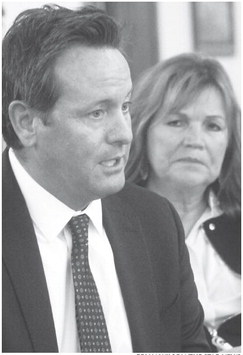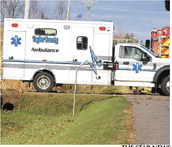Insurance change has workers seeing red
County workers say they will be going backward due to committee action
A move to reverse course on a proposed major change to the county’s employee insurance program was blocked by interpretation of parliamentary procedure rules at the October 13 county finance and personnel committee meeting.
At the October 4 meeting, committee members voted 4-3 to switch from a statewide WCA Trust health insurance plan to a narrow Marshfield Clinic-only health insurance plan with the option of allowing employees to pay the full cost of buying up to a plan that would allow them to continue to see providers in the Aspirus system.
At last week’s meeting, committee member Lester Lewis attempted to make a motion for the county to stay with WCA Trust which would effectively reverse the action taken at the earlier meeting.
“We worry about recruitment and retention. I have been assured that we won’t be retaining some employees if we take on the Marshfield plan,” Lewis said. Lewis noted that historically the county would tell employees that while they could not pay as well as the private sector, government employment offered great benefits. “We are no longer even close on wages,” Lewis said, saying that the county should stay with WCA Trust with some plan changes and an increase in the employee share of deductible rather than making a major insurance change that will cause some employees to have their premiums double in order to continue to see their local doctors.
Committee member Scott Mildbrand, who was serving as chairman in the absence of committee chairman Chuck Zenner, would not allow Lewis to make the motion.
“I will be unable to accept it because you were on the losing side,” Mildbrand said. He said he anticipated Lewis making the motion and had checked with county attorney RuthAnn Koch prior to the meeting. Under parliamentary procedure, the general meeting rules followed by Taylor County and most governmental entities, only those who vote in the majority on an issue may make a motion to reconsider. Mildbrand said he viewed it as a motion to reconsider and said that Lewis could wait until the full county board session on Oct. 26 to make the motion then. “You will have your chance at the county board,” Mildbrand said.
Lewis objected to the lawyer’s interpretation. “I disagree with the corporation counsel,” he said, noting that he introduced a new motion at a meeting where it was on as an agenda item more than a week after the action at the previous meeting was taken.
Mildbrand said he put his trust in the advice he received from the county’s attorney. In addition to Zenner, committee members Ray Soper and Rollie Thums were absent from the meeting. Under the attorney’s interpretation of the rules, only Mildbrand would have been eligible to make the motion to go with a different plan option because he was the only member present at the meeting who voted in favor of going with the Marshfield Clinic - only plan. “I am not going to make that motion,” Mildbrand said.
“This morning on TV they said we are at a 40-year high in inflation. I think CPI is 9.1%. As a county, our employees are suffering, our taxpayers are suffering, I know I am suffering from it,” Mildbrand said. “I believe it is the county board’s job to balance, I think we have to have a balance to help out employees through this mess but still keep in mind taxpayers are suffering as well.”
Mildbrand suggested he would be open to the idea of softening the blow for employees by having the county pick up one-third of the cost of employees buying up to the broader plan. This would bring the cost for an employee plus one from paying an additional $286 per month to paying $134 per month. None of the other committee members expressed support for that idea.
County highway commissioner Ben Stanfley noted that this would still have employees going backward as the insurance premiums being paid by employees would be larger than the cost of living raises the committee approved to be included in the budget.
Stanfley was one of a handful of county department heads and other county board members at the meeting to voice concerns and ask questions about the proposed insurance changes. Committee members also heard from representatives from the WCA Trust and Security Health Plan.
One of the major concerns, Stanfley said was of the distance and time involved in having to travel a distance to see providers, even for relatively minor or routine items. It was noted that for the past several years the county has been pushing for staff members to use local providers. This allows workers to take a partial day off for doctors rather than a full day.
With no date on when construction of a planned Marshfield Clinic facility in Medford will begin, the closest providers under the Marshfield Clinic-only plan are in Colby. Aspirus has a hospital and clinic in Medford as well as clinics in Gilman and Prentice.
The county had looked to the change as a way to take more than 10% reduction in current health insurance premium costs over the existing plan while avoiding a large rate increase. The switch could potentially save the county more than $550,000.
Stanfley said there will be additional time off to travel to the appointments out of the area, but was most critical of the increase in costs being put on employees.
He said buying up on the family plan would be about $3,700 in additional cost per year, along with an increased deductible while the 4% raise proposed in the budget would be about $2,000 or less. He said this has the workers going backward.
“You are really taking a lot of benefits away from employees,” he said, noting that employees realize they will have to pay more for insurance but that this was a significant amount of out of pocket costs when the county is seeing significant savings.
Suzanne Stanfley, who is the director of the county’s human services department, also expressed frustration from her staff many of whom were upset that they first learned about the proposed change by reading about it in the Oct. 6 issue of The Star News rather than getting word from the county itself.
County board member Mike Bub questioned using an increase in the employee share of health insurance premiums as a way to offset some of a possible premium increase rather than making major changes. He noted that about five years ago there had been talk of stepping the employee share of the cost from 15% up to 20%. Finance director Larry Brandl said the county sees about $25,000 in savings per percentage increase in the amount employees pay. However he didn’t think they needed to go all the way to 20% at this time.
“You pick your poison,” Bub said, noting it is a difference between more costs for employees or having to reduce the staffing headcount. “I don’t think there is a no cost solution here,” Bub said.
In answer to concerns about the distances involved, the representative from Security Health Plan said the telehealth option was available 24 hours a day, seven days a week where people on Security Health Plan could contact providers at no out of pocket cost. The representative noted that when used with a cellphone app it puts people face to face with a provider. Mildbrand said he felt this would solve the issue of having to travel distances and eliminate the need for employees to be gone for a full day rather than a half day for their children’s appointments.
With no action by the committee, the plan to switch employee health insurance will move forward and be finalized at the Oct. 26 county board session.
Borrowing approved
Committee members voted 3-1 with Lewis opposed, to authorize borrowing of up to $700,000 for county capital construction projects thereby removing that expense from the county budget calculations. Because loan payments are not included in the state levy cap formula, this will allow the county to levy to pay off the additional amount right away.
Brandl said he has secured an interest rate of 3.74% for the short-term borrowing with local financial institutions. The county is looking to have the loan for about 90 days and Brandl said the cost to the county would be about $7,500. He said he is patterning it off of how Clark County does it, noting that county has done this for a number of years.
Brandl said that depending on what the county does at the budget session, he would expect the actual amount needed to borrow would be much lower. “We wouldn’t need to borrow all,” he said.
Mildbrand said he was concerned about getting into a cycle of needing to do short-term borrowing every year with the amount needed each year climbing.
“We are paying it back in months, not years,” Brandl said, noting that it allows the county to raise the taxes they need to operate efficiently.
Lewis noted that when it is being reported that the inflation is at a 40-year high, that was in 1982 when Ronald Reagan was president and that for much of the past four decades inflation rates have been extremely low. “It doesn’t stay at the high rate,” he said.
In other business, committee members:
Approved resolutions to recreate the county code governing committees to clean up the language with committee structure changes made at the April county board session. It was noted that Chapter 7, which dealt with the personnel committee, was being kept empty to avoid creating issues with cross references other places in the codes. Bub noted that coming out of human services there was a mandated committee that will need to be formed. “Number 7 will not be empty long,” he said.
Approved changes to the county ordinances to have the treasurer’s office hours increased from 35 to 40 hours per week. This had previously been approved as part of the county budget hearings.
“We worry about recruitment and retention. I have been assured that we won’t be retaining some employees if we take on the Marshfield plan.”
— County Board member Lester Lewis





